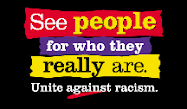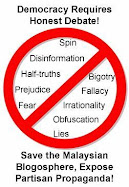
- From The American Heritage Dictionary of the English Language, Fourth Edition: devoted to or biased in support of a party, group, or cause
- From the Collins Essential English Dictionary, 2nd Edition 2006: prejudiced or one-sided
Of late, I have been writing quite a bit (most recently here) about why I believe that our Malaysian blogosphere has become extremely partisan, and increasingly bereft of honest argument and reasoned debate. When I surf Malaysian blogs and online news, I often get an uneasy feeling that there is something very wrong with the ideas being "sold". Unfortunately, it's not always easy for me to put my finger on what's wrong (and no, it's not the tapai pulut I had this morning). I realise that I need to be better at thinking critically; therefore, I am starting a series of postings in which I shall attempt to analyse and describe the biased, prejudiced and one-sided arguments that I find in our Malaysian blogosphere. Will you to join me in this endeavour?
Let's be very clear on one thing - there is absolutely nothing wrong with a blogger or writer having strong political beliefs and affiliations, or with expressing them vigorously and with passion. However, as I have stated before, we have a responsibility to argue our cases justly and honestly; if not to our readers, then at least for the sake of our own conscience. Democracy needs a forum for honest discussion and open debate on issues of National interest; telling one's side of the story is fine, but pretending to tell both sides while misrepresenting the other is dishonest.
For this first installment, I'd like to analyse a post by Shamsul Yunos, who blogs at "My Anger, it May Be Yours Too". In his recent entry, "Did you know lawyers are special?", he criticises the Malaysian Bar Council for saying that lawyers should not be arrested while on duty. This statement was made by Bar Council president Ragunath Kesavan on 16 August 2009, during the public inquiry by Suhakam into the arrest and detention of five lawyers of the Kuala Lumpur Legal Aid Centre at the Brickfields Police Station on 7 May 2009. The lawyers were arrested when they tried to see their clients, who were among 14 arrested that day for taking part in a candlelight vigil (for arrested political scientist and activist Wong Chin Huat), outside said police station. The Bar Council's description of what transpired that day is available here, and you can read the five arrested lawyers' own accounts here, here, here, here and here. The only statement from the police (regarding anything related to the arrests) that I could find was in this video.
Let's get a few facts straight first:
- Even if the 14 arrested individuals had commited a crime by holding the vigil, they had the right of access to a legal practitioner of their choice, as per Section 28A (4) of the Criminal Procedure Code (CPC) and Article 5 of the Federal Constitution. Granted, that Section 28A (8) of the CPC allows the police to refuse lawyers access to their clients, but it should be invoked only in extraordinary circumstances; such as when the delay in questioning the suspect may cause the occurrence of another crime or cause danger to others, e.g. when the client may pass harmful information to an outsider via the lawyer, or hide evidence, such as in kidnap cases. When the police were asked for the grounds on which they were invoking that clause, they were unable to provide an answer. To date, there has been no explanation from the police whatsoever as to why they invoked Section 28A (8) of the CPC.
- The lawyers arrested were trying to provide their clients with legal counsel in their professional capacity as members of the Bar Council's Legal Aid Centre; they were not part of the candlelight vigil. Although lawyers do take part in protests, they know how to separate their professional duties from their activism. They were in no shape or form a threat to public order or safety, or obstructing justice, which could have justified their arrest that night. In applying to see their clients in the police station that night, they were merely fulfilling their obligations as advocates and solicitors.
- The Bar Council did not call for blanket immunity for lawyers while on duty. They are neither seeking nor expecting preferential treatment nor exemptions from the law. They seek instead to uphold the fundamental right of lawyers to have access to their clients, a right which was arbitrarily denied by the police when they refused to let the lawyers see their clients, and arrested them instead.
- The role of the police in a democratic country, is to enforce the law and ensure public safety and order. To enable our police to fulfil their responsibilities, they are delegated wide discretionary powers, e.g. to deny permission to assemble and to issue orders to disperse. However, they must never forget that the raison d'etre of law enforcement is to uphold our human rights (including the right to assemble peacefully), not to deny them arbitrarily or for political reasons. They must also never forget that they are public servants, and that they are accountable for their actions and decisions.
- Liken lawyers to "particularly odorous boogers" to be flicked out of a moving car onto gravel
- Imply that they drink lots of alcohol
- Accuse them of lying for a living
- Imply that they are too cowardly to stand up for what they believe in
- Characterise them being wealthy and stingy
- Accuse them of speaking with "forked tongues", without thinking first
- Ad hominem arguments
- Appeal to prejudice
- Demonizing the enemy
- Name-calling
- Stereotyping
Let's look at Shamsul's more "substantive" arguments. The first thing to note, is that he has (intentionally or not) neglected to quote from, refer to or even provide links to Ragunath's statements as reported in the news. Neither has he mentioned the context in which the statement was made, namely the arbitrary denial of a fundamental human right, the arrests of the five lawyers, and Suhakam's public inquiry into it. Why is this important? When he first refers to the statement by BC president, he follows it with "What the F does that mean?" Is he trying to imply that the Bar Council's position is unclear, unreasonable or difficult to understand? Would the Bar Council's position have been in any way unclear to anyone who had read their statements and was aware of the issues involved?
Next, he uses a "straw man" argument, i.e. by substituting a superficially similar (and weaker) proposition (the "straw man") for his oponents' real one, then refuting it, without ever having actually refuted their original position. Shamsul does this by first conceding that lawyers should not be arrested if they are not breaking any laws. Then he writes, "but I hardly think that anyone in this country should get time out just because they are on duty." The straw man that he is putting up here is that the Bar Council called for blanket immunity for all lawyers on duty, even if they break the law. A glance at this headline shows how grossly Shamsul has misrepresented the Bar Council's position, and again, he neglects to consider the human rights issues involved. Knowing the whole truth reveals Shamsul Yunos' argument for what it is.
Instead of honestly discussing the possibility that it's in the public interest that lawyers and their clients have certain rights and privileges, he goes on to use a rhetorical question to make light of the issue; he sarcastically suggests that the Bar Council asked for special treatment ("different laws" as he put it) because lawyers believe that they are superior to others.
So, what are we to make of the post in question? Should we dismiss it as the prejudiced pronouncements of a partisan propagandist? Well, Shamsul Yunos does not want us to think so; as he maintains (in response to a reader's comment to a different post) here, "I put forth both sides of the story". Yeah, right!
One thing that disturbs me very much, is that in between the put downs, slurs and hyperbole, Shamsul makes a sinister, chilling statement with dangerous implications for human rights, freedom and justice in Malaysia. He writes: "If lawyers think arrest is a risk they do not want to face, then do not accompany people who the police may want to arrest. hey a champion must make scarifices, a warrior must be brave..."
Take a moment to consider exactly what he is saying. Is he implying that if lawyers work for or defend people whom the police (or the government) do not like or approve of, then they should be prepared to face arrest and persecution from the authorities?
As a result of our 12th general elections (GE-12), Malaysia is now at a crossroads, from where, for the first time in a long while, we have a choice of taking a path to a future that we want for ourselves & our children. Malaysians from all walks of life have been increasingly vocal in expressing our dissent against racism, bigotry, corruption, oppression, bad governance, tainted law enforcement and judiciary; both individually as well as via mass protests and demonstrations.
However, not everyone is happy that we have this choice, and there are those who would prefer that we return to the days before GE-12, and even further back, to Mahathirism. I believe that there are efforts being taken that, if we are not vigilant, will roll back the progress that we have made of late. These efforts include inhibiting democratic expression and eroding the foundations of our basic human rights, by various means. Our laws and legal system (such as it is), and our lawyers, are vital elements in the defense of our human rights and freedoms. Equal protection and access to justice would be just an empty slogan without the right to legal counsel. Are people like Shamsul Yunos part of an effort to reduce our legal community's effectiveness (and motivation) in standing up for human rights? I believe so.
So, who is Shamsul Yunos? The first entry on his blog dates back to 27 April 2008 (incidentally, 50 days after the GE-12). According to Rocky, who introduced Shamsul's blog here, and regularly refers to it in his own posts, Shamsul Yunos is a journalist. Googling for "Shamsul Yunos", I found (assuming that they are all one and the same person) that he writes for the Malay Mail. I also found that a Shamsul Yunos attended the Asia Media Summit 2008, held on 27 - 28 May 2008 in Kuala Lumpur. In this list of delegates, he is referred to as a Special Writer from the Ministry of Information, Malaysia. I do not know what exactly a "Special Writer" in the Ministry of Information is, but if it's possible to define one from what one writes, then perhaps we should compare how he has written about the Bar Council's position with this description:
A propagandist, in the strict sense, is not interested in the truth for its own sake, or in spreading it. His purpose is different. He wants a certain kind of action from us. He doesn't want people to think for themselves. He seeks to mold their minds so that they will think as he wants them to think, and act as he wants them to act. He prefers that they should not think for themselves. If the knowledge of certain facts will cast doubts in the minds of his hearers, he will conceal these facts.What are the key lessons to draw from reading Shamsul Yunos' post? IMHO, they are:
From The Art of Making Sense: A Guide to Logical Thinking by Lionel Ruby
- Always look for the other side of the story and its context, from another source. Do not expect that Shamsul has provided it for us
- Look for propaganda techniques designed to evoke an emotional and irrational response to the subject of the story
- Look for dishonest arguments, e.g. the "straw man", and rhetorical questions used to divert attention away from real issues.
- Always look for affiliations and links to organisations. Such affiliations are not evidence of propaganda per se, but are a useful guide for us to look for potential bias and vested interest
Sincerely,
Malaysian Heart






















Unfortunately almost everyone of us are partisan in some sense. Look at the mystery letter of TBH inquest, nobody is interested in the auhencity of the letter. Almost everyone especially the opposition supporters treat this as conclusiive proof that the MACC was directly involved in the murder of TBH BEFORE the inquest is over.
ReplyDeleteWhat about the PDRM on TBH's case who concluded before the start of the police investigation that they look from the angle of suicide based on what was told to them by the MACC ?
ReplyDeleteCan we dismiss the investigation findings as well ?